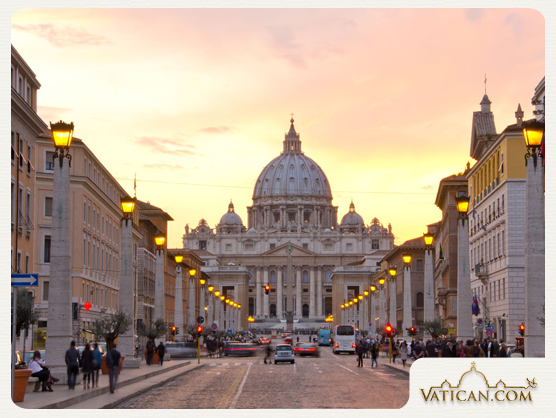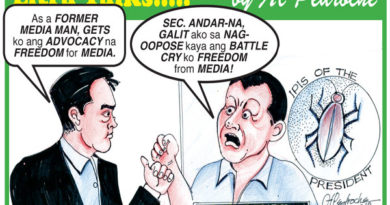OP-ED COLUMNISTS: OPINION ON PAGE ONE BY FRANCISCO TATAD – ‘Is Christianity at risk?’
OPINION ON PAGE ONE BY FRANCISCO TATAD
AS a Catholic layman, I am often asked why I write more about politics than of serious Catholic topics. I do not have the spirituality nor talent of the novelist Michael O’Brien who writes nothing but Catholic novels and essays, but I have never shied away from a good exchange on Catholic matters. This Holy Week offers a fresh opportunity for this; but beyond the call of the liturgical season, some statements associated with recent events lead me to take up the challenge. The hasty passage of the divorce bill in the House and some wild push toward “same-sex marriage” have emboldened some pro-divorce and LGBT people to claim that the support for marriage in this predominantly Catholic country is going down, and that it’s time the Church changed some of her orthodox views if she is to keep her place in the modern world.
Indeed, it is no great revelation that the support for marriage as the permanent and exclusive union of one man and one woman, primarily for the purpose of bearing children to ensure the propagation of the species, has eroded. But I do not believe the solution to this problem is to make marriage non-exclusive and less permanent for the sheer convenience of those who are having certain difficulties. Basic math would have disappeared from my first year high school if my teachers at sixth grade decided to change the arithmetical formulas just because my poor class could not add. The Ten Commandments would have become suspect had Yahweh or Moses rewritten the First Commandment just to keep the Israelites from worshipping the molten calf.
The ills of divorce
The harm that divorce inflicts on families, especially on children, is abundantly documented; the benefits, if any, especially to the children, are sadly not. In the 1980s, I had the opportunity to do a lecture tour across the American Midwest, and had the chance to see a parent putting a kid on board a plane in one airport, and another parent receiving the same kid at the next airport. In all those instances, it was the child whose face spoke volumes about the pain divorce had caused the families. Divorce obscures the connection between marriage and parenting, and all over America, to name just one continent, it has created fatherless and motherless children, as David Blankenhorn and other authors have testified.
As the three Princeton scholars—Sherif Girgis, Ryan T. Anderson and Robert P. George—point out in their book, What Is Marriage? (Encounter Books, New York and London, 2013), divorce diminishes the social pressures and incentives for husbands to remain with their wives and children, (and) for men and women having children to marry first. The resulting arrangements—parenting by divorced or single parents, or cohabiting couples—have the worst effects on children.
Null and void
The divorce bill passed the House without any meaningful debate. Speaker Pantaleon Alvarez, who has openly boasted of keeping a mistress in the House, threatened to punish members who would oppose it, even without declaring that many congressmen with extramarital relations, like himself, needed it. He seemed convinced that with a divorce law, he could prevent his estranged wife from contesting his congressional seat in 2019 using his family name, “Alvarez.” He and his gang obviously forgot that the Constitution regards marriage as “the foundation of the family,” and an “inviolable social institution,” which shall be protected by the State, as Archbishop Gilbert Garcera of Lipa, chairman of the Episcopal Commission on Family and Life, pointed out in his statement.
This makes any divorce bill void ab initio. Were the Senate to follow the action of the House, the resulting legislation would not be law, but “violence,” according to St. Thomas. The fact that Alvarez and company railroaded the bill for their own carnal “interests” violates the cardinal rule that no one shall propose any legislation for their own personal benefit. This makes the bill doubly void ab initio. But it appears there is an even more execrable reason for their pushing the divorce bill, namely to kick the Catholic Church in the face for exercising her teaching authority on faith and morals, which they want to expropriate for the State.
In a statement of unsurpassed crassness and vulgarity, Alvarez has been quoted as saying—I hope mistakenly—why should anyone oppose divorce when Jesus, whom the Bible quotes as saying what God has joined together, no man must separate, “was not even born in the Philippines?” That such a philistine should sit as Speaker of the House is the gravest insult and injury President Rodrigo Duterte could ever have inflicted upon our people, through his servile and sycophantic Congress.
The Church attacked
Still this pales in comparison to the suggestion that the Church adjust her matrimonial laws to the fads and fashions of the modern world to make herself “relevant.” The attack is no longer simply on marriage, but on Christianity and the Church. This deserves a timely response.
Christianity is not simply a set of religious precepts and moral principles which we can debate; it is living like Christ and in Christ. In The Christian Idea of Man, Josef Pieper says, “the Christian ought to be ‘another Christ’,” and “to be perfect like the father of Jesus Christ.” This is the kind of Christian the Church will need, not to adapt to the modern world, but to provide the standards for the modern world.
A Papal prophesy
In his book, Faith and the Future, (Libreria Editrice Vaticana, Vatican City, 2006), Pope Emeritus Benedict XVI provides a deep prophetic insight, and I will quote from it at length.
The great theologian writes: “The future of the Church can and will issue from those whose roots are deep and who live from the pure fullness of their faith. It will not issue from those who accommodate themselves merely to the passing moment or from those who merely criticize others and assume that they themselves are infallible measuring rods; nor will it issue from those who take the easier road, who sidestep the passion of faith, declaring false and obsolete, tyrannous and legalistic, all that makes demands upon men, that hurts them and compels them to sacrifice themselves. To put this more positively: the future of the Church, once again as always, will be reshaped by saints, by men, that is, whose minds probe deeper than the slogans of the day, who see more than others see, because their lives embrace a wider reality…
“How does all of this affect the problem we are examining? It means that the big talk of those who prophesy a Church without God and without faith is all empty chatter. We have no need of a Church that celebrates the cult of action in political prayers. It is utterly superfluous. Therefore it will destroy itself. What will remain is the Church of Jesus Christ, the Church that believes in the God who has become man and promises us life beyond death. The kind of priest who is no more than a social worker can be replaced by the psychotherapist and other specialists; but the priest who is no specialist, who does not stand on the sidelines, watching the game, giving official advice, but in the name of God places himself at the disposal of men, who is beside them in their sorrows, in their joys, in their hope and in their fear, such a priest will certainly be needed in the future.
Smaller but stronger Church
“Let us go a step farther. From the crisis of today the Church of tomorrow will emerge—a Church that has lost much. She will become small and will have to start afresh more or less from the beginning. She will no longer be able to inhabit many of the edifices she built in prosperity. As the number of her adherents diminishes, so will she lose many of her social privileges. In contrast to an earlier age, she will be seen much more as a voluntary society, entered only by free decision. As a small society, she will make much bigger demands on the initiative of her individual members. Undoubtedly, she will discover new forms of ministry and will ordain to the priesthood approved Christians who pursue some profession.
“In many smaller congregations or in self-contained small groups, pastoral care will normally be provided in this fashion. Alongside this, the full-time ministry of the priesthood will be indispensable as formerly. But in all of the changes at which one might guess, the Church will find her essence afresh and with full conviction in that which was always at her center: faith in the triune God, in Jesus Christ, the Son of God made man, in the presence of the Spirit until the end of the world. In faith and prayer she will again recognize her true center and experience the sacraments again as the worship of God and not as a subject for liturgical scholarship.
More spiritual too
“The Church will be a more spiritual Church, not presuming upon a political mandate, flirting as little with the Left as with the Right. It will be hard going for the Church, for the process of crystallization and clarification will cost her much valuable energy. It will make her poor and cause her to become the Church of the meek.
“The process will be all the more arduous, for sectarian narrow-mindedness as well as pompous self-will will have to be shed… (It) will be long and wearisome as was the road from the false progressivism of the eve of the French Revolution—when a bishop might be thought smart if he made fun of dogmas and even insinuated that the existence of God was by no means certain—to the renewal of the nineteenth century. But when the trial of this shifting is past, a great power will flow from a more spiritualized and simplified Church…
“And so it seems certain to me that the Church is facing very hard times. The real crisis has scarcely begun. We will have to count on terrific upheavals. But I am equally certain about what will remain at the end: not the Church of the political cult, which is dead already with Goebel, but the Church of faith. She may well no longer be the dominant social power to the extent that she was until recently; but she will enjoy a fresh blossoming and be seen as man’s home, where he will find life and hope beyond death.”
I adopt as my own the hope of this great theologian and Pope.
Manila Times / ON










